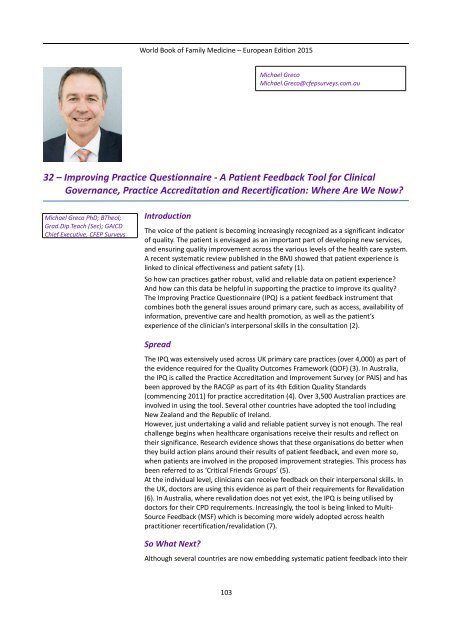Family Medicine
World Book 2015
World Book 2015
Create successful ePaper yourself
Turn your PDF publications into a flip-book with our unique Google optimized e-Paper software.
World Book of <strong>Family</strong> <strong>Medicine</strong> – European Edition 2015<br />
Michael Greco<br />
Michael.Greco@cfepsurveys.com.au<br />
32 – Improving Practice Questionnaire - A Patient Feedback Tool for Clinical<br />
Governance, Practice Accreditation and Recertification: Where Are We Now?<br />
Michael Greco PhD; BTheol;<br />
Grad.Dip.Teach (Sec); GAICD<br />
Chief Executive, CFEP Surveys<br />
Introduction<br />
The voice of the patient is becoming increasingly recognized as a significant indicator<br />
of quality. The patient is envisaged as an important part of developing new services,<br />
and ensuring quality improvement across the various levels of the health care system.<br />
A recent systematic review published in the BMJ showed that patient experience is<br />
linked to clinical effectiveness and patient safety (1).<br />
So how can practices gather robust, valid and reliable data on patient experience?<br />
And how can this data be helpful in supporting the practice to improve its quality?<br />
The Improving Practice Questionnaire (IPQ) is a patient feedback instrument that<br />
combines both the general issues around primary care, such as access, availability of<br />
information, preventive care and health promotion, as well as the patient’s<br />
experience of the clinician’s interpersonal skills in the consultation (2).<br />
Spread<br />
The IPQ was extensively used across UK primary care practices (over 4,000) as part of<br />
the evidence required for the Quality Outcomes Framework (QOF) (3). In Australia,<br />
the IPQ is called the Practice Accreditation and Improvement Survey (or PAIS) and has<br />
been approved by the RACGP as part of its 4th Edition Quality Standards<br />
(commencing 2011) for practice accreditation (4). Over 3,500 Australian practices are<br />
involved in using the tool. Several other countries have adopted the tool including<br />
New Zealand and the Republic of Ireland.<br />
However, just undertaking a valid and reliable patient survey is not enough. The real<br />
challenge begins when healthcare organisations receive their results and reflect on<br />
their significance. Research evidence shows that these organisations do better when<br />
they build action plans around their results of patient feedback, and even more so,<br />
when patients are involved in the proposed improvement strategies. This process has<br />
been referred to as ‘Critical Friends Groups’ (5).<br />
At the individual level, clinicians can receive feedback on their interpersonal skills. In<br />
the UK, doctors are using this evidence as part of their requirements for Revalidation<br />
(6). In Australia, where revalidation does not yet exist, the IPQ is being utilised by<br />
doctors for their CPD requirements. Increasingly, the tool is being linked to Multi-<br />
Source Feedback (MSF) which is becoming more widely adopted across health<br />
practitioner recertification/revalidation (7).<br />
So What Next?<br />
Although several countries are now embedding systematic patient feedback into their<br />
103


